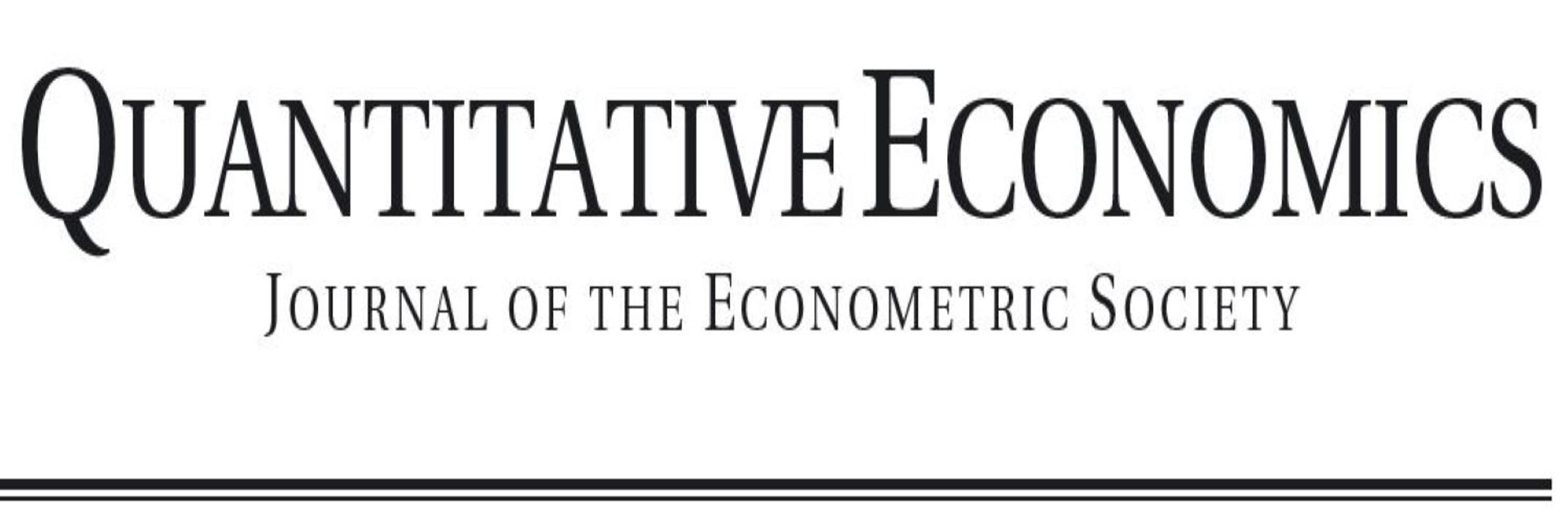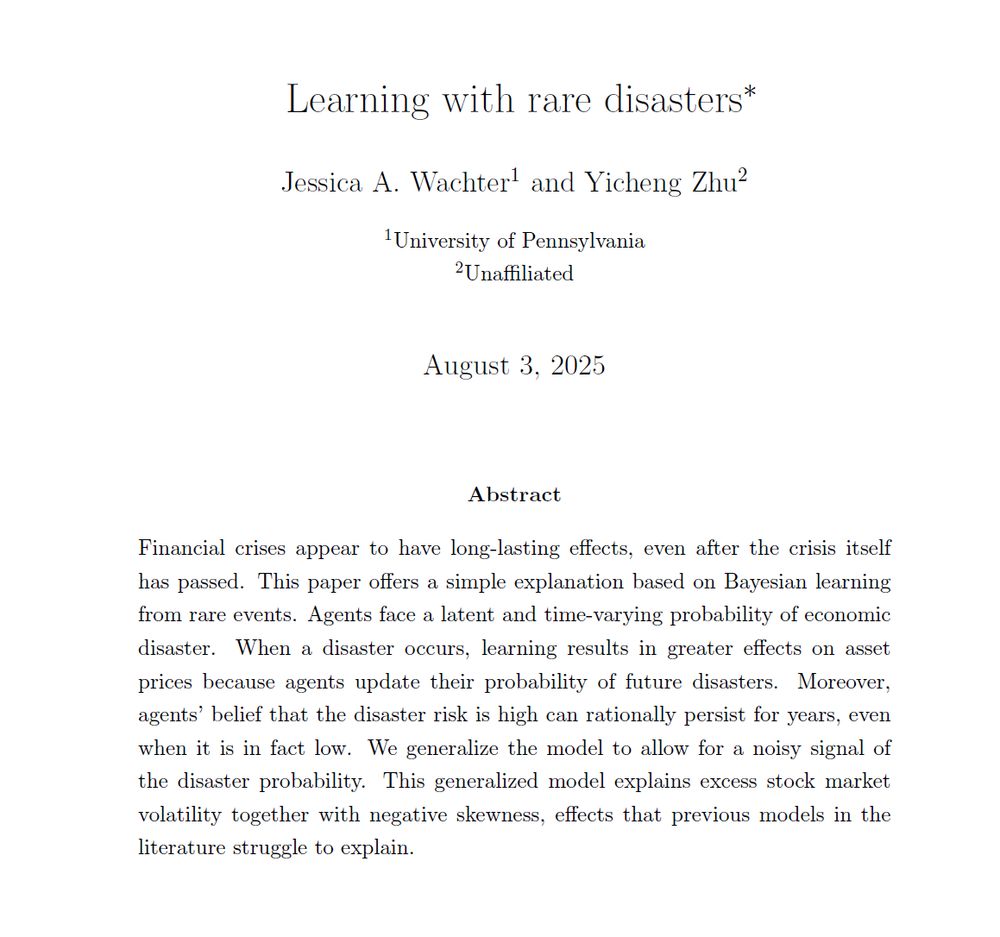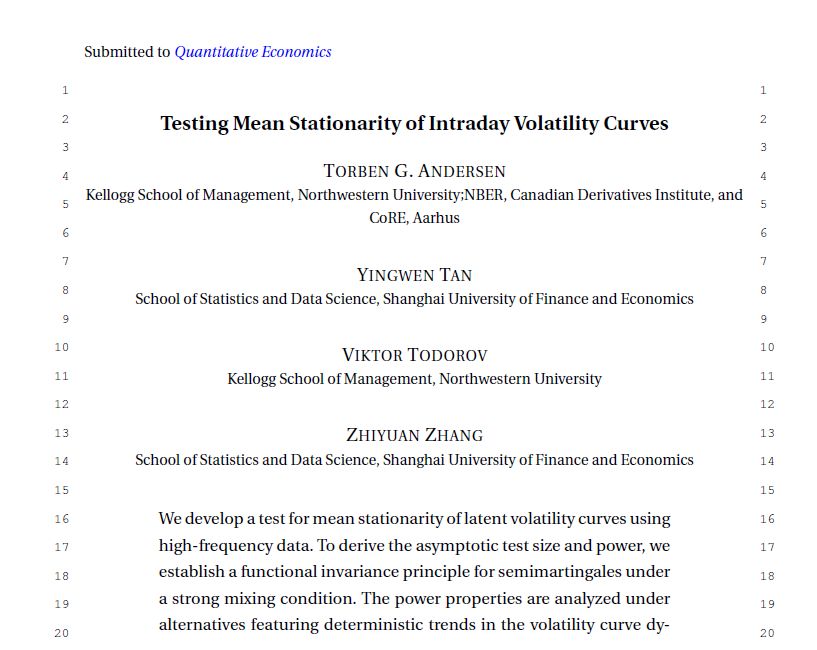
Quantitative Economics
@qe-editors.bsky.social
News from the editors of Quantitative Economics
We build a world economy HANK model for the Euro Area, Core & Periphery. Fiscal consolidation under current EA rules is costly, but aligning debt targets with historical values greatly reduces welfare losses. @xiaoshan__chen @lazarakis_s @p_varthalitis buff.ly/eZXPt91

November 10, 2025 at 2:03 PM
We build a world economy HANK model for the Euro Area, Core & Periphery. Fiscal consolidation under current EA rules is costly, but aligning debt targets with historical values greatly reduces welfare losses. @xiaoshan__chen @lazarakis_s @p_varthalitis buff.ly/eZXPt91
How do durables affect consumption smoothing? Asymmetric information lowers their value as a smoothing tool. We measure lemons penalty for cars using Danish data and show income shocks sustain used car market @richardblundell.bsky.social @ran-gu.bsky.social buff.ly/3j30eyQ

October 31, 2025 at 2:06 PM
How do durables affect consumption smoothing? Asymmetric information lowers their value as a smoothing tool. We measure lemons penalty for cars using Danish data and show income shocks sustain used car market @richardblundell.bsky.social @ran-gu.bsky.social buff.ly/3j30eyQ
Using a nonlinear Proxy-SVAR, we find that oil supply cuts have large real effects but small on prices and oil supply increases have small real effects but large on prices. We rationalize this asymmetry through the behavior of uncertainty. buff.ly/pcaDo6G

October 27, 2025 at 2:03 PM
Using a nonlinear Proxy-SVAR, we find that oil supply cuts have large real effects but small on prices and oil supply increases have small real effects but large on prices. We rationalize this asymmetry through the behavior of uncertainty. buff.ly/pcaDo6G
China’s 2014–16 LTV relaxation spurred mortgages and home prices. Loan-level evidence + a quantitative model uncover a new housing investment channel: capital gains fueled upsizing while crowding out consumption. buff.ly/TJ7j8yQ

October 22, 2025 at 1:06 PM
China’s 2014–16 LTV relaxation spurred mortgages and home prices. Loan-level evidence + a quantitative model uncover a new housing investment channel: capital gains fueled upsizing while crowding out consumption. buff.ly/TJ7j8yQ
We develop an empirical minimax-regret policy learning algorithm which can assign never-before-observed treatment values to a population, by combining data on a subset of possible treatment values with shape restrictions on treatment response. buff.ly/S0hflec

October 13, 2025 at 1:04 PM
We develop an empirical minimax-regret policy learning algorithm which can assign never-before-observed treatment values to a population, by combining data on a subset of possible treatment values with shape restrictions on treatment response. buff.ly/S0hflec
The homogeneity assumption in dynamic discrete games allows pooling data across markets and time. This paper proposes an approximate randomization test for this assumption via MCMC, with an application to the U.S. cement industry. buff.ly/avaeEOS

October 2, 2025 at 1:04 PM
The homogeneity assumption in dynamic discrete games allows pooling data across markets and time. This paper proposes an approximate randomization test for this assumption via MCMC, with an application to the U.S. cement industry. buff.ly/avaeEOS
Higher property taxes raise long-run welfare. By shifting capital from housing to businesses they lower house prices and interest rates and boost wages, thereby improving life-cycle consumption smoothing. However, current homeowners lose from such a reform.https://buff.ly/Py8ec3Q

September 22, 2025 at 1:03 PM
Higher property taxes raise long-run welfare. By shifting capital from housing to businesses they lower house prices and interest rates and boost wages, thereby improving life-cycle consumption smoothing. However, current homeowners lose from such a reform.https://buff.ly/Py8ec3Q
The Executive Committee of the Econometric Society has approved an increase in the publication fees for papers in its two Open Access journals, Quantitative Economics and Theoretical Economics. Read more www.econometricsociety.org/society/news...
Changes in Publication Fees for Quantitative Economics and Theoretical Economics - The Econometric Society
The Executive Committee of the Econometric Society has approved an increase in the publication fees for papers in its two Open Access...
www.econometricsociety.org
September 12, 2025 at 3:31 PM
The Executive Committee of the Econometric Society has approved an increase in the publication fees for papers in its two Open Access journals, Quantitative Economics and Theoretical Economics. Read more www.econometricsociety.org/society/news...
We develop a stochastic macro-climate model to analyze the influence of climate change on asset returns. Quasi-analytical formulas allow to price various types of long-dated assets, including fixed-income products, derivatives, and equities. buff.ly/bQ2SxBv

September 11, 2025 at 1:03 PM
We develop a stochastic macro-climate model to analyze the influence of climate change on asset returns. Quasi-analytical formulas allow to price various types of long-dated assets, including fixed-income products, derivatives, and equities. buff.ly/bQ2SxBv
"Many random coefficient choice models are nonparametrically identified, using exclusion restrictions. Logit shocks are not needed." @JRehbeck buff.ly/jkCr0xS

September 1, 2025 at 1:03 PM
"Many random coefficient choice models are nonparametrically identified, using exclusion restrictions. Logit shocks are not needed." @JRehbeck buff.ly/jkCr0xS
Why do crises leave lasting scars on markets? A model of Bayesian learning about rare disasters shows that beliefs adjust slowly: risk premia spike, asset values fall, volatility persists, and returns skew negative—even after the shock itself fades buff.ly/pWQVBOX

August 28, 2025 at 1:00 PM
Why do crises leave lasting scars on markets? A model of Bayesian learning about rare disasters shows that beliefs adjust slowly: risk premia spike, asset values fall, volatility persists, and returns skew negative—even after the shock itself fades buff.ly/pWQVBOX
We challenge standard predictive algorithm evaluation, proposing Comprehensive OOS Evaluation via Statistical Decision Theory. Achieving this requires ML researchers to collaborate with econometricians and statisticians to tackle SDT's computational hurdles buff.ly/2xDJTkl

July 28, 2025 at 1:02 PM
We challenge standard predictive algorithm evaluation, proposing Comprehensive OOS Evaluation via Statistical Decision Theory. Achieving this requires ML researchers to collaborate with econometricians and statisticians to tackle SDT's computational hurdles buff.ly/2xDJTkl
Quantitative Economics Volume 16, Issue 3 (July 2025) is now online
www.econometricsociety.org/publications...
www.econometricsociety.org/publications...

July 25, 2025 at 6:22 PM
Quantitative Economics Volume 16, Issue 3 (July 2025) is now online
www.econometricsociety.org/publications...
www.econometricsociety.org/publications...
We propose a test for mean stationarity in latent volatility curves using high-frequency data. Applied to S&P 500 futures, results show strong evidence of nonstationary volatility—key for real-time risk, jump detection & market activity metrics. buff.ly/MFtu4Ou

July 15, 2025 at 1:02 PM
We propose a test for mean stationarity in latent volatility curves using high-frequency data. Applied to S&P 500 futures, results show strong evidence of nonstationary volatility—key for real-time risk, jump detection & market activity metrics. buff.ly/MFtu4Ou
We are excited to announce the following new AEs joined the board on July 1st: Esteban M. Aucejo (ASU), Job Boerma (University of Wisconsin-Madison), Liangjun Su (Tsinghua University) & Chamna Yoon (Seoul National University). We look forward to benefiting from their expertise.
July 1, 2025 at 4:04 PM
We are excited to announce the following new AEs joined the board on July 1st: Esteban M. Aucejo (ASU), Job Boerma (University of Wisconsin-Madison), Liangjun Su (Tsinghua University) & Chamna Yoon (Seoul National University). We look forward to benefiting from their expertise.
We are thrilled to have Anna Mikusheva (MIT) and Fabrizio Perri (Federal Reserve Bank of Minnesota) join the editorial board as Co-editors starting July 1st, 2025. While their focus will be respectively on econometrics and on macroeconomics, they will be handling papers in a wide range of topics.
July 1, 2025 at 12:57 PM
We are thrilled to have Anna Mikusheva (MIT) and Fabrizio Perri (Federal Reserve Bank of Minnesota) join the editorial board as Co-editors starting July 1st, 2025. While their focus will be respectively on econometrics and on macroeconomics, they will be handling papers in a wide range of topics.
On June 30, 2025 Garance Genicot and Morten Ravn stepped down as Co-editors of Quantitative Economics. We are very grateful to them for their contributions; the journal has greatly benefited from their insight and energy.
July 1, 2025 at 12:56 PM
On June 30, 2025 Garance Genicot and Morten Ravn stepped down as Co-editors of Quantitative Economics. We are very grateful to them for their contributions; the journal has greatly benefited from their insight and energy.
We are thrilled to have Bernard Salanié (Columbia University) take over as Editor starting July 1st, 2025. He will be handling papers in a wide range of topics, from applied theory to econometrics.
July 1, 2025 at 12:24 PM
We are thrilled to have Bernard Salanié (Columbia University) take over as Editor starting July 1st, 2025. He will be handling papers in a wide range of topics, from applied theory to econometrics.
On June 30, 2025 Stéphane Bonhomme stepped down as Editor of Quantitative Economics. Stéphane did a fantastic job as an editor; the editorial board and the Econometric Society leadership express their warmest thanks to him.
July 1, 2025 at 12:23 PM
On June 30, 2025 Stéphane Bonhomme stepped down as Editor of Quantitative Economics. Stéphane did a fantastic job as an editor; the editorial board and the Econometric Society leadership express their warmest thanks to him.
We develop a framework to study segregation dynamics that brings Schelling's key insights to models of residential choice. We also introduce novel IVs to identify causal effects of neighborhood demographics that can be easily constructed with panel data. buff.ly/YOfZkAP

June 23, 2025 at 1:03 PM
We develop a framework to study segregation dynamics that brings Schelling's key insights to models of residential choice. We also introduce novel IVs to identify causal effects of neighborhood demographics that can be easily constructed with panel data. buff.ly/YOfZkAP
Quantitative Economics Volume 16, Issue 2 (May 2025) is now online
www.econometricsociety.org/publications...
www.econometricsociety.org/publications...

June 9, 2025 at 11:43 PM
Quantitative Economics Volume 16, Issue 2 (May 2025) is now online
www.econometricsociety.org/publications...
www.econometricsociety.org/publications...
We propose methods to estimate optimal dynamic treatment rules under policy constraints. We clarify the trade-off between backward induction and simultaneous optimization. The methods achieve optimal regret rate and accommodate intertemporal constraints. buff.ly/A32TTrk

May 12, 2025 at 1:00 PM
We propose methods to estimate optimal dynamic treatment rules under policy constraints. We clarify the trade-off between backward induction and simultaneous optimization. The methods achieve optimal regret rate and accommodate intertemporal constraints. buff.ly/A32TTrk
This paper develops moment conditions for dynamic ordered logit models with fixed effects, allowing consistent GMM estimation in short panels without assumptions on unobserved heterogeneity. @bohonore.bsky.social @weidnerecon.bsky.social buff.ly/WSsNScT

May 1, 2025 at 1:01 PM
This paper develops moment conditions for dynamic ordered logit models with fixed effects, allowing consistent GMM estimation in short panels without assumptions on unobserved heterogeneity. @bohonore.bsky.social @weidnerecon.bsky.social buff.ly/WSsNScT
The 2025 Best Paper Prize has been awarded to Amit Gandhi, Zhentong Lu, and Xiaoxia Shi for their paper “Estimating Demand for Differentiated Products with Zeroes in Market Share Data” www.econometricsociety.org/prizes/qe-te... Congratulations to the authors!
Best Paper Award for QE and TE
www.econometricsociety.org
April 25, 2025 at 12:35 AM
The 2025 Best Paper Prize has been awarded to Amit Gandhi, Zhentong Lu, and Xiaoxia Shi for their paper “Estimating Demand for Differentiated Products with Zeroes in Market Share Data” www.econometricsociety.org/prizes/qe-te... Congratulations to the authors!
We show weak exogeneity can bias OLS in time series with many controls, making it inconsistent. Bias grows with regressors and autocorrelation. We propose a correction method, yielding a consistent, asymptotically Gaussian estimator. buff.ly/7xiKQ1d

April 7, 2025 at 2:03 PM
We show weak exogeneity can bias OLS in time series with many controls, making it inconsistent. Bias grows with regressors and autocorrelation. We propose a correction method, yielding a consistent, asymptotically Gaussian estimator. buff.ly/7xiKQ1d

